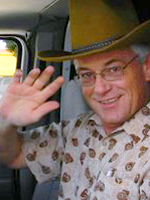Without insurance, taxpayers on hook
By Leon WordenWednesday, November 18, 1998
| D |
Whittaker announced it is selling Porta Bella to a brand new entity called Porta Bella Acquisition Co., an investor group formed to shepherd Porta Bella through the cleanup process. The sale price was $10 million, plus a $5 million promissory note and a contingent interest in the project. In other words, Whittaker still has a $5 million ownership interest, plus a decision-making role that is yet undisclosed.
It's a fancy way for Whittaker to move Porta Bella off its balance sheet. The Simi Valley company recorded heavy losses last year. This year it has been shedding major assets to make its bottom line look better to Wall Street investors. Whittaker would look even worse with a nonperforming asset sitting on its books for several years.
Whittaker has no insurance for Porta Bella. At least, that's what the company told the Securities and Exchange Commission. It told a Signal reporter a different story. Which time was it telling the truth? I'm more inclined to believe what it reluctantly admits to a government agency than what a PR person tells the media.
According to Whittaker's most recent quarter-end financial statements, "In certain years, after evaluating the availability and cost of insurance, the company did not purchase insurance for certain risks. ... The company's insurance carriers have taken the position that in certain cases the company is uninsured for environmental matters."
"The company is a potentially responsible party in a number of actions filed under (CERCLA), also known as 'Superfund.' ... The company had provided for its aggregate liability related to various claims ... in connection with the environmental matters noted above but excluding the environmental remediation activities related to its property located in the city of Santa Clarita."
Who cares if Whittaker has insurance? You do.
Mayor Jan Heidt told The Signal, "We went through all that years ago."
Well, we're going through it again.
"Years ago," in 1996, nobody knew that perchlorates — an inorganic chemical that inhibits the thyroid gland's ability to utilize iodine to produce thyroid hormones required for normal body metabolism, growth and development — had found their way into our local groundwater. Years ago, the city believed Whittaker when it said there were only 14 toxic sites at Porta Bella and 13 had been cleaned. Now there are 77 potentially toxic sites. Years ago, everyone thought Whittaker would uphold its end of the bargain when it came to indemnifying the city against future lawsuits.
The city was right for making Whittaker indemnify the city. If anyone gets maimed or killed or poisoned because of something the city or environmental inspectors missed once the building permits are issued, Whittaker should have to pay.
But the city was negligent for not making Whittaker carry insurance. Whittaker has been in financial trouble, and now we find out it hasn't paid insurance premiums for Porta Bella. Guess who pays if something goes wrong? It won't take Johnnie Cochran to convince a jury that Santa Clarita was at least partially at fault for issuing the building permits.
How many multi-million-dollar lawsuits can our city's general fund handle?
Perchlorates were first detected in drinking water in California in early 1997. According to the state Department of Health Services, "no federal or state drinking water standards exist," although the agency has temporarily deemed 18 parts perchlorate per billion parts water as safe. "Treatment technologies for the removal of perchlorate from drinking water are currently unavailable."
Identified perchlorate sources include Whittaker-Porta Bella in Santa Clarita, at up to 370 parts per billion; Jet Propulsion Laboratory in Pasadena and an Aerojet facility in Azusa.
Last month, Aerojet, a manufacturer of custom chemicals, weapons and propulsion systems, announced it had opened an experimental perchlorate treatment facility in Rancho Cordova, a Sacramento suburb.
According to Larry Ladd, a community of Rancho Cordova representative on Aerojet's health assessment site team, "Perchlorate was protected from environmental regulation by Cold War national security interests. ... So far, Whittaker holds the record for the highest level of perchlorate exposure. Whittaker used a former dairy barn outside Hollister, Calif., to manufacture explosive bolts, and subsequently the neighboring Sanchez family well had 810 parts per billion perchlorate in it.
"It ends up that in the three ... households closest to the dairy barn, the ladies of the house have suffered from post-partum thyroiditis, hypothyroidism and fatal breast cancer."
Porta Bella's toxic problems will be discussed at 7 p.m. tomorrow at City Hall.
©1998 LEON WORDEN — ALL RIGHTS RESERVED

